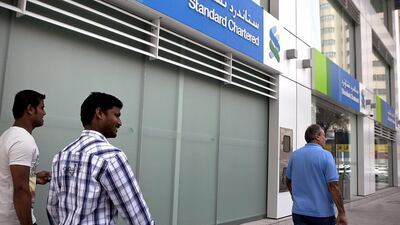Standard Chartered, the specialist emerging-market lender, said operating income in the Middle East and Africa fell by 3 per cent in the first quarter amid currency devaluations in Africa and lower financial market income from the Middle East.
Operating income fell to US$686 million in the first three months of the year compared to $709m the same quarter last year, the bank said without providing any other financial details about the two regions’ financial performance in the quarter.
“Income from Africa and the Middle East of $686m was 3 per cent lower year-on-year, impacted by local currency depreciation in Africa and lower financial markets income in the Middle East, which was only partly offset by improved margins and higher balances in cash management,” the bank said.
“Income improved 5 per cent compared to the fourth quarter of 2016 due to better performance in wealth management and financial markets.”
The bank, which has been facing pressure from declining oil prices, said in November that it cut 150 jobs in the UAE with more expected to be shed amid a lending slowdown across the banking sector.
The bank in 2015 revealed plans to axe 15,000 jobs worldwide after years of losses, but it did not say at the time how many positions would be lost across its local operations. The lender has been badly hit as the value of most commodities, which underpin the economies of many emerging markets including that of the Arabian Gulf, have fallen sharply.
More than 90 per cent of the bank’s business comes from emerging markets, and growth in these commodity-rich regions has slowed in recent years as the price of everything from oil, steel and palm oil collapses amid a drop-off in demand from heavy consumers such as China.
At the same time, emerging-market currencies have weakened against the dollar and deficits have widened.
While the UAE has made strides in diversifying its economy, the weak oil price still represents a drag.
As a result, deposits at banks have fallen as governments tap funds to plug deficits and ensure spending on key projects goes ahead as planned.
That has made it more difficult for them to lend, especially as the number of businesses under stress have risen, which has increased risk.
As a group, the bank said its profit before taxation from all its operations rose 98 per cent to $990m in the first three months of the year from $500m in the same period last year as money set aside for bad debt fell 58 per cent to $198m from $471m in the same period the previous year.
“We are making good progress improving the performance of the group,” said Bill Winters, the group chief executive.
“The significantly increased profit before tax results from particularly low loan impairment and our focus on cost control. Competition in our markets remains intense but our investments in the business and focus on our clients is making us more competitive and will enable us to deliver sustainable income growth over time.”
mkassem@thenational.ae
Follow The National's Business section on Twitter

